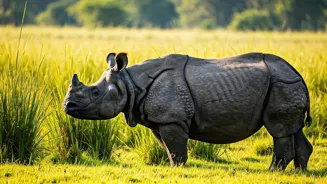Rhinos Return: Dudhwa
The state of Uttar Pradesh has witnessed a remarkable shift in its eco-tourism sector, spearheaded by the reintroduction of rhinos into Dudhwa National
Park. This initiative provides a unique chance for tourists to immerse themselves in the wild landscapes of India. The reintroduction of rhinos isn't simply about increasing wildlife populations; it is a move that offers an intimate experience with nature, allowing individuals to witness the resilience of wildlife and the ongoing conservation efforts aimed at preserving India's natural heritage. The rhinos' presence serves as a crucial symbol of conservation success, opening up novel avenues for sustainable tourism in Uttar Pradesh.
Eco-Tourism Adventure Awaits
The return of rhinos presents a novel opportunity for those seeking an authentic eco-tourism experience. Visitors to Dudhwa National Park can look forward to more than just a wildlife sighting. They'll experience the intricate dynamics of an ecosystem, including the roles of different species and their influence on the environment. The presence of rhinos adds an extra layer of excitement and wonder to the area's natural beauty, turning a simple journey into a lasting memory. This shift toward eco-tourism promotes responsible and sustainable travel, enabling travelers to actively contribute to the conservation of wildlife while enjoying the untouched beauty of the Indian landscape.
Ecosystem Engineers: Rhinos
Rhinos have a considerable impact on their environment; therefore, their return is a positive event. They are important for ecosystem health. Rhinos, as large herbivores, feed on vegetation and sculpt their environment, preventing the overgrowth of certain plants. They also aid in seed dispersal through their dung. The return of rhinos affects the wider ecosystem, encouraging other species' biodiversity. Their presence is a sign of ecological balance and highlights the effectiveness of conservation efforts. By carefully managing rhino populations, experts can improve the overall health and diversity of the environment.
Tourism, Community Impact
The emergence of eco-tourism, spurred by the rhino reintroduction, has important implications for the local population and the economy. Tourists visit Dudhwa National Park, which results in the development of employment opportunities in the fields of hospitality, guiding, and conservation, enhancing the local economy. This influx of visitors creates revenue that can be allocated to support local infrastructure, enhance healthcare, and further improve the living standards of the community. Tourism also boosts conservation initiatives by generating funding and awareness. The community plays a crucial role in protecting the rhinos and managing tourism in a sustainable manner, helping ensure the area's natural treasures are preserved for generations.
A Century-Long Comeback
The reintroduction of rhinos into Uttar Pradesh is the culmination of years of dedicated conservation efforts. This achievement shows how conservation initiatives can succeed, turning past problems into future prospects. The commitment to protecting the habitat and the rhino population highlights the cooperation between various organizations. The rhino's return is an achievement that gives hope for the future and demonstrates the possibility of wildlife conservation. The initiative will serve as an example for similar projects in India and throughout the world. The ongoing efforts in Uttar Pradesh show that conservation is achievable and beneficial, paving the way for a bright future for rhinos and the communities that live alongside them.












